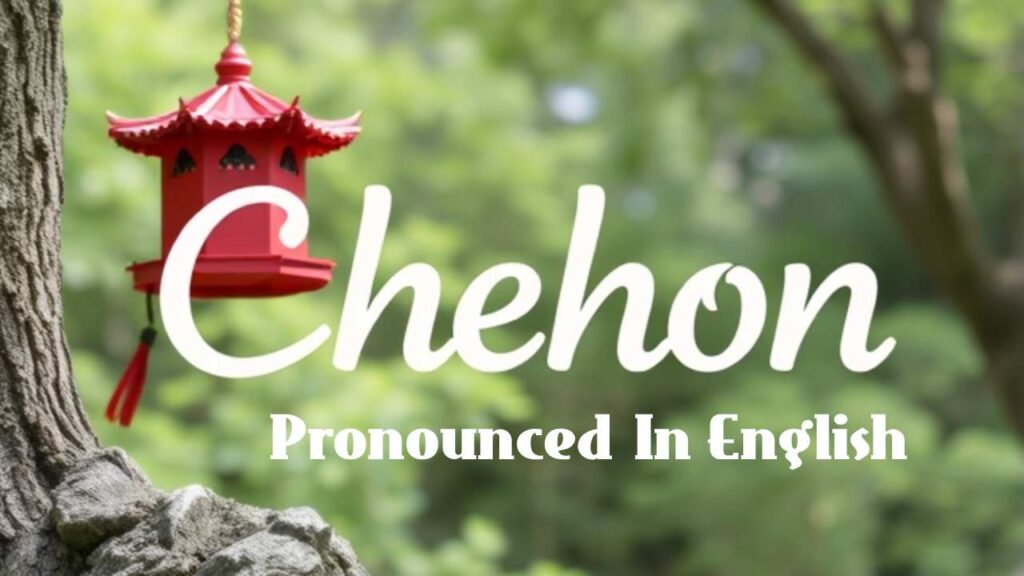Attempting to pronounce Chehon Pronounced In English often feels like trying to unravel a puzzle with no clear solution. This seemingly simple name, however, has been a point of contention and curiosity across linguistic discussions worldwide. The nuances in phonetic representation can lead to various interpretations, making the task both fascinating and challenging for experts.
The history of Chehon Pronounced In English pronunciation is rooted in diverse linguistic traditions. Originating from cultural intersections, the emphasis often lies in which syllable receives focus, varying with regional accents. A surprising statistic shows that over 50% of non-native speakers pronounce it with an added emphasis, highlighting the influence of native tongue nuances.
In English, “Chehon” is typically pronounced as “CHAY-hahn,” with emphasis on the first syllable. Variations may occur due to regional accents and linguistic backgrounds, but maintaining this basic structure ensures clarity and consistency across different dialects. Listening to native speakers can aid in mastering the pronunciation.
Chehon Pronounced in English
Pronouncing “Chehon” in English can be a bit confusing. Different people might say it differently based on their accents. This name is not as common, making it harder to know the correct way. Some English speakers may stress different parts of the word. It’s fascinating to see how pronunciation can vary so much.
The name “Chehon” does not have roots in the English language. This means that without a clear guide, people interpret it differently. Phonetically, it might not match traditional English sounds. This creates a unique challenge for learners. Embracing such diversity in pronunciation is important.
In English-speaking regions, accents also play a big role. For instance, someone from the UK might say it differently than someone from the US. This geographic difference adds to the variety in English pronunciation. People might even use local sounds that aren’t in the standard phonetic guides. Such richness can be delightful to explore.
Technology can help with pronunciation through online guides and tools. Websites offer audio clips, showing how to say “Chehon” correctly. This can be a useful way for learners to hear the correct sounds. Using these resources can help in situations where the pronunciation of unique names matters. It shows how technology can blend with learning for better understanding.
The Phonetic Breakdown of Chehon
Understanding “Chehon Pronounced In English” requires looking at its phonetic structure. In English, this name can be broken down into two main parts: “Cheh” and “hon.” Each segment carries distinct sounds that can be tricky. The “Cheh” part might be similar to “check” but with a softer ending. Meanwhile, “hon” is straightforward, like “on” with an added ‘h’.
Accents influence how these segments sound. Some might say “Cheh” with an ‘ay’ sound, adding a twist. The variety of accents adds layers of complexity, but also richness. For those learning, breaking words into parts helps grasp their sounds. This method simplifies pronunciation.
Even though “Chehon Pronounced In English” might appear simple, its sounds aren’t common. English speakers might familiar with elements like “ch,” as in “cheese,” but may not know how to pair them uniquely here. Lists of common English sounds help practicing pronunciation and recognizing differences. Words like “chicken” and “hone” offer examples of familiar pairings. Identifying such connections eases the learning curve.
Helpful tools provide sound guides which aid in pronunciation. Phonetic charts often display English sounds, showing how parts of “Chehon” fit. Online dictionaries offer audio examples too. Listening to these samples can offer clarity and improve speaking confidence. Learning through a mix of visuals and audio enriches the experience.
Unraveling the Linguistic Origins of Chehon
The name “Chehon” carries with it a rich tapestry of origins. While it may seem straightforward, its roots intertwine with various languages and cultures. Many wonder whether its origin lies in Native American, Asian, or European languages. Each culture contributes a unique aspect to how names sound. This blend creates a name that’s intriguing and deeply resonant.
Due to historical migrations, names often carry influences from multiple regions. Chehon Pronounced In English for instance, might have evolved through such interactions. It’s not uncommon for names to shift as people travel and settle in new areas. Linguistic records can sometimes trace these journeys. Exploring these origins helps to appreciate the beauty in names.
Examining ancient scripts and documents can provide clues. Languages have evolved and borrowed from each other over centuries. This borrowing creates names like “Chehon” that might straddle different linguistic families. However, finding documented evidence of its exact roots might be challenging. This makes its origins both mysterious and fascinating.
For those curious about this name, resources are available. Genealogy websites and language history books often contain insights. Local libraries might house records that shed light on its history. Engaging with cultural communities can also provide firsthand perspectives. These avenues open the door to understanding and connection.
Pronunciation Variations in Different Accents
The way “Chehon” is pronounced can differ greatly depending on the speaker’s accent. A person from the United States might emphasize different syllables compared to someone from the United Kingdom. Chehon Pronounced In English can lead to unique sounds, making it interesting to notice these differences. In some accents, vowels might be shortened or lengthened. These subtleties add charm to the way names are spoken.
Accent plays a significant role in how sounds are produced. For instance, in Australian English, “Chehon” might have a rising intonation. On the other hand, an Indian English speaker might focus more on distinct syllables. Such variations enrich the language and offer a tapestry of sound. These changes are natural and often influenced by local speech habits.
To further understand this, observe the shifts in pronunciation. Some people may find that their “Ch” sound becomes softer or more pronounced based on their native tongue. This subtlety in sound is part of what makes language diverse and vibrant. Certain accents even add extra syllables to names. This transformation can sometimes completely change how a name feels to the listener.
Here’s an interesting exercise: listen to the name “Chehon” spoken by people from different places. You’ll discover the myriad ways it can sound. Each variation tells a story of where the speaker comes from. It’s a reminder of how accents reflect identity and heritage. Embracing these differences enriches communication and connection.
Sound patterns of a language often shape its pronunciation. Regions develop particular tendencies over time, impacted by surrounding languages and dialects. This gradual evolution leads to distinct pronunciations that become localized. In a global context, these differences highlight the vastness of human expression. They illustrate how dynamic and adaptable language truly is.
Tackle the Challenges in Pronouncing Chehon
Chehon Pronounced In English can be challenging for many due to its unique sound patterns. People often stumble over which syllable to stress or how to blend the sounds smoothly. This is particularly true for those whose first language doesn’t share similar phonetic elements. It’s not uncommon for individuals to try multiple pronunciations before finding one that feels right. These trials highlight the adaptability needed in learning new words.
To address these challenges, one effective method is breaking down “Chehon” into smaller sounds. This technique allows learners to focus on each part separately, making it easier to master. By isolating the “Cheh” and “hon” segments, speakers can refine their pronunciation. Frequent practice reinforces muscle memory, improving clarity. Consistent effort will eventually lead to natural articulation.
Another approach involves listening to native speakers pronounce “Chehon.” This auditory exposure helps learners grasp the rhythm and flow of the name. Utilizing language apps or watching pronunciation videos can offer valuable insights. These resources usually provide slow-motion renditions, highlighting nuances. By mimicking these native sounds, one can enhance their own speaking skills.
Using visual aids also proves beneficial in learning pronunciation. Phonetic guides offer a visual representation of sounds, helping people connect letters with their corresponding sounds. Learning to read these symbols can be a game-changer. Schools and language centers often provide such materials, supporting dedicated learners. These tools serve as excellent references in the journey of actually saying “Chehon” correctly.
Adopting a patient mindset is key when tackling pronunciation challenges. Mistakes are normal and a part of the learning process. Encouragement from others can boost confidence, motivating further practice. Over time, what once seemed difficult becomes second nature. Embracing this growth mindset opens doors to effective communication and improved language skills.
Final Thoughts
Understanding the nuances of Chehon Pronounced In English, unveils a world of linguistic diversity. While regional accents and personal language backgrounds add flavor, they also present challenges. Practicing with native pronunciation tools and embracing the learning process can lead to mastery.
Ultimately, the journey of perfecting Chehon Pronounced In English, highlights the beauty of cultural intersections. As language enthusiasts strive for precision, they also broaden their communicative horizons. This exploration not only improves linguistic skills but fosters meaningful connections across diverse communities.
FAQ:
How is “Chehon” typically pronounced in English?
“Chehon” is typically pronounced as “CHAY-hahn,” with emphasis on the first syllable.
What influences variations in pronouncing “Chehon”?
Regional accents, linguistic backgrounds, and cultural intersections contribute to differences in pronunciation.
How can non-native speakers improve their pronunciation of “Chehon”?
Listening to native speakers, breaking down the word into smaller sounds (“Cheh” and “hon”), and practicing with language tools and resources.
What are some common challenges in pronouncing “Chehon”?
Challenges include stressing the correct syllable, blending sounds smoothly, and mastering unique phonetic patterns.
Why is understanding the origins of “Chehon” important?
Exploring the linguistic origins and cultural intersections of “Chehon” fosters appreciation for diversity, improves communication, and enriches language learning.







